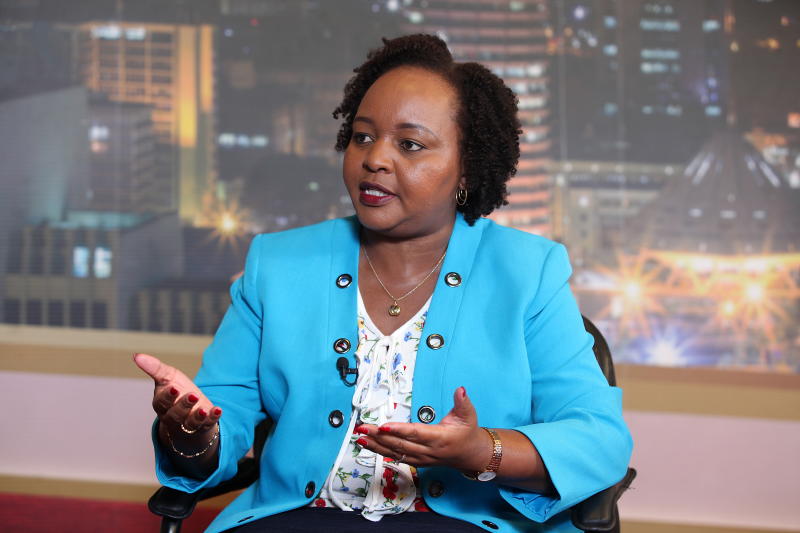Anne Waiguru has a reason to smile after the High Court temporarily barred the Kirinyaga County Assembly against authorising any withdrawal of county cash.
While issuing his ruling a case the embattled governor had filed, Justice Weldon Korir temporarily suspended the implementation of the Kirinyaga county budget estimates for the financial year 2020/2021.
“An interim conservatory order is hereby issued suspending and staying off the Kirinyaga county fiscal strategy paper 2020 as illegally and unilaterally amended and approved by the county Assembly pending hearing and determination of the petition,” ordered the judge.
Further, the court issued interim orders preventing the assent and publication of Kirinyaga County Appropriation Bill 2020. Justice Korir also ordered National Treasury not to authorize any withdrawals from the county revenue fund through IFMIS which it operates by virtue of section 12(1) of the Public Finance Management Act 2012.
Justice Korir rendered the verdict the same day Controller of Budget Margaret Nyakang’o sided with the governor terming the decision by the Kirinyaga Ward representatives to dramatically alter the budget as illegal.
On Tuesday, Ms Nyakang’o appeared before the Senate Committee on Devolution and Intergovernmental relations via Zoom, accusing the MCAs of violating the law in approving the 2020-21 County budget and Appropriations Bill.
“The law allows the Executive to prepare a budget, which the assembly will pass or decline, but they cannot contravene the law by alliterating it in its entirety, which is illegal. After identifying the areas which were not compliant with the law, the assembly went ahead and just prepared their own budget, so to say. This one was without any consultation, as we have confirmed, that it [budget] did not come from the CEC finance as is allowed in the PFM Act,” Nyakang’o told the committee chaired by Homa Bay Senator Moses Kajwang.
At the same time, the Controller of Budget was directed by the High Court not to authorise the withdrawal from the County Revenue Fund based on the illegally approved budget estimates and the Appropriations Bill passed on June 30.
In her argument, Waiguru says the county assembly varied the Annual Budget estimates by a wide and unprecedented margin of between 68 per cent and 278 per cent contrary to the 1 percent permitted by law.
Governor Waiguru accused the MCAs altering the Executive’s budget, a move she insisted was politically instigated to her administration to a halt.
“This budget that was approved by the county assembly was political and done in bad faith, only aimed at grounding the operations of the county government,” Waiguru said.
On June 30, the Kirinyaga County Assembly, which had impeached Waiguru but its decision overturned by Senate, approved the budget estimates with variations going up to 30 per cent which the governor argues was contrary to the provisions of the Public Finance Management Act 2012.
According to the Controller of Budget Margaret Nyakang’o, the Ward Reps violated the Procurement Act and the accompanying regulations when they altered the budget by more than one per cent.
“PFM County government regulations 2015 which specifies that where a county assembly approves any changes in the annual estimates, any increase or reduction in the expenditure of the vote shall not exceed one per cent,” she said siding with Governor Waiguru that the MCAs increased the county assembly development vote by Sh631 million without consulting county Finance Executive.
While accusing the Kirinyaga MCAs of allocating themselves more money, the budget boss warned that Kirinyaga county government could be sliding into a cash crunch in the midst of the court cases.
The Bill was set to come into effect on Thursday after the lapse of the seven-day period provided for in law before the court stopped its implementation.



















